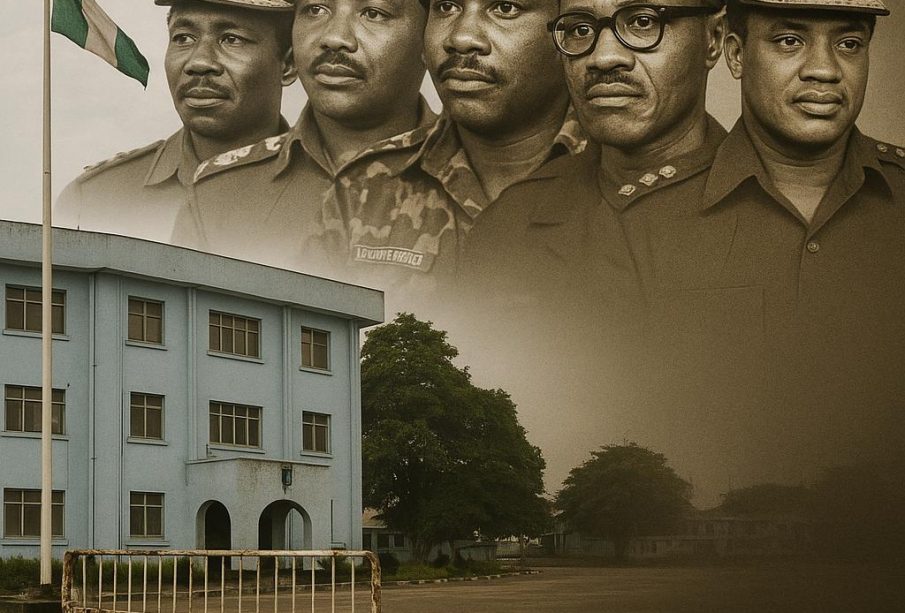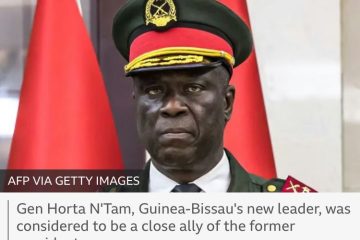
Dodan Barracks with Nigeria’s past military leaders (Gowon, Murtala, Obasanjo, Buhari, Babangida) in a symbolic montage
By Dr. Michael Omoruyi | iNewsAfrica Editorial Feature
Where Power Once Slept, and the Nation’s Fate Was Decided
There was a time when the most powerful address in Nigeria was not Aso Rock Villa in Abuja — but Dodan Barracks, an imposing military fortress tucked in the heart of Ikoyi, Lagos. To many Nigerians, it was more than a residence; it was a throne of decrees, where the fate of over 200 million people could shift overnight at the sound of a soldier’s boots.
From this barracks flowed orders that shaped the soul of the nation — coups plotted, constitutions suspended, and reforms announced with the echo of martial drums. Dodan Barracks was not just a military command post; it was the very pulse of power in Nigeria’s years of military rule.
A Seat of Power Born from Crisis
When Nigeria’s young democracy stumbled after independence, Dodan Barracks rose to prominence as the headquarters of military might and national authority. It became the symbol of order amid chaos, the place where coups found their legitimacy and where the promise of stability was broadcast to a nation yearning for direction.
It was from Dodan Barracks that General Yakubu Gowon commanded the nation through the Nigerian Civil War, navigating a divided country under the slogan “No Victor, No Vanquished.” It was from here that General Murtala Mohammed electrified the country with his reformist zeal before his tragic assassination in 1976 — his fiery spirit still echoing through those barrack walls.
From Obasanjo to Babangida: The Long March of the Military
After Murtala’s death, General Olusegun Obasanjo carried on from Dodan Barracks with a mission to restore civilian governance. His eventual handover in 1979 marked a rare moment of military humility — a promise that Nigeria could breathe again under democratic rule.
But that breath was short-lived. The barracks soon roared back to life under Major General Muhammadu Buhari, whose 1983 coup brought a stern era of discipline and austerity. His “War Against Indiscipline” found its headquarters in Dodan Barracks — a war fought with slogans, fear, and conviction.
Then came General Ibrahim Badamasi Babangida, who transformed Dodan Barracks into a laboratory of political experiments. From his office in Ikoyi, he launched sweeping economic reforms and promised a transition that ultimately never came. The June 12 annulment — the wound that still bleeds in Nigeria’s democratic conscience — was conceived within those same walls before power finally shifted to Abuja.
From Barracks to Ballots: The End of a Military Era
The relocation of Nigeria’s capital to Abuja in the early 1990s marked the symbolic end of Dodan Barracks’ dominance. The fortress that once held the nation captive became a shadow of its former self — a relic of a bygone age of khaki governance and command decrees.
Today, Dodan Barracks remains under military control, its gates still guarded, its walls still whispering the secrets of power. But to the modern Nigerian, it stands as a monument — a silent reminder of the decades when men in uniform decided the country’s destiny.
A Lesson from the Barracks
In revisiting the legacy of Dodan Barracks, Nigerians must confront a deeper truth: our history is inseparable from our hunger for strong leadership. Yet, history also warns that power concentrated without accountability leads not to progress but paralysis.
Dodan Barracks was both a fortress of discipline and a chamber of fear. It embodied the paradox of Nigeria — a nation that has often traded freedom for order, and reform for control. As we chart our democratic future, we must remember that true leadership does not need walls to protect it, but values to sustain it.
The Echoes of History
Standing before the old gates of Dodan Barracks today, one cannot help but feel the ghosts of Nigeria’s past — the parades, the gun salutes, the decrees read at dawn. The question remains: have we learned from the lessons written in those barrack walls?
For in those echoes lie the stories of ambition, sacrifice, and betrayal — the very essence of Nigeria’s journey from barracks to ballots, from command to conscience.
About the Author
Dr. Michael Omoruyi is a technologist, author, and founder of iNewsAfrica, a digital media platform dedicated to reshaping Africa’s narratives through truth, innovation, and thought leadership. He writes extensively on governance, leadership, and the moral architecture of Africa’s future.

Dr. Omoruyi’s memoir launches across Amazon and other bookstores Worldwide – October 21, 2025
Follow iNewsAfrica channel on WhatsApp:
https://whatsapp.com/channel/0029VbAPrqI96H4JXXQrKP1V











